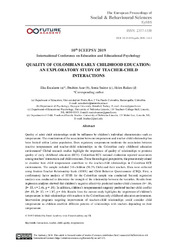Quality of Colombian early childhood education: An exploratory study of teacher-child interactions
| dc.contributor.author | Escalante, E. | |
| dc.contributor.author | Acar, İbrahim Hakkı | |
| dc.contributor.author | Suárez, S. | |
| dc.contributor.author | Raikes, H. | |
| dc.date.accessioned | 2024-03-14T12:06:20Z | |
| dc.date.available | 2024-03-14T12:06:20Z | |
| dc.date.issued | 2019 | |
| dc.identifier.issn | 2357-1330 | en_US |
| dc.identifier.uri | http://hdl.handle.net/10679/9299 | |
| dc.identifier.uri | https://www.europeanproceedings.com/article/10.15405/epsbs.2019.11.63 | |
| dc.description.abstract | Quality of adult-child relationships could be influence by children's individual characteristics such as temperament. The examination of the association between temperament and teacher-child relationship has been limited within Latino population. Does regulatory temperament moderate the association between reactive temperament and teacher-child relationships in the Colombian early childhood education environment? Global research studies highlight the importance of quality of relationships to promote quality of early childhood education (ECE). Colombian ECE national evaluation reported association among teachers' interactions and child outcomes. From the ecological perspective, the present study aimed to examine how child temperament contribute to the teacher-child relationships in Colombian ECE environments. The sample included 316 children (58.3% Girls) and their teachers. Data were collected using Student-Teacher Relationship Scale (STRS) and Child Behavior Questionnaire (CBQ). First, a confirmatory factor analysis of STRS for the Colombian sample was conducted. Second, regression analysis was conducted to determine the strength of the relationship between the variables. Results from regression analyses showed that children's negative affectivity predicted teacher-child closeness (b = .06, beta = .15, t = 2.46, p = .01). In addition, children's temperamental surgency predicted teacher-child conflict (b= .08, beta= .12, t = 1.97, p = .04). Results from the current study highlights the importance of children's temperament in their relationships with teachers in the Colombian early childhood education environment. Intervention programs targeting improvement of teachers-child relationships could consider child temperament as children establish different patterns of relationships with teachers depending on their temperament. (C) 2019 Published by Future Academy www. | en_US |
| dc.language.iso | eng | en_US |
| dc.publisher | Future Academy | en_US |
| dc.relation.ispartof | ICEEPSY 2019 - 10th International Conference on Education and Educational Psychology | |
| dc.rights | openAccess | |
| dc.rights | Attribution-NonCommercial-NoDerivs 4.0 International | |
| dc.rights.uri | https://creativecommons.org/licenses/by-nc-nd/4.0/ | |
| dc.title | Quality of Colombian early childhood education: An exploratory study of teacher-child interactions | en_US |
| dc.type | Conference paper | en_US |
| dc.publicationstatus | Published | en_US |
| dc.contributor.department | Özyeğin University | |
| dc.contributor.authorID | (ORCID 0000-0003-4007-5691 & YÖK ID 267848) Acar, İbrahim | |
| dc.contributor.ozuauthor | Acar, İbrahim Hakkı | |
| dc.identifier.volume | 72 | en_US |
| dc.identifier.startpage | 537 | en_US |
| dc.identifier.endpage | 548 | en_US |
| dc.identifier.wos | WOS:000569023400063 | |
| dc.identifier.doi | https://doi.org/10.15405/epsbs.2019.11.63 | en_US |
| dc.subject.keywords | Interactions | en_US |
| dc.subject.keywords | Teacher | en_US |
| dc.subject.keywords | Child | en_US |
| dc.subject.keywords | Quality | en_US |
| dc.subject.keywords | Temperament | en_US |
| dc.relation.publicationcategory | Conference Paper - International - Institutional Academic Staff |
Files in this item
This item appears in the following Collection(s)
Share this page




